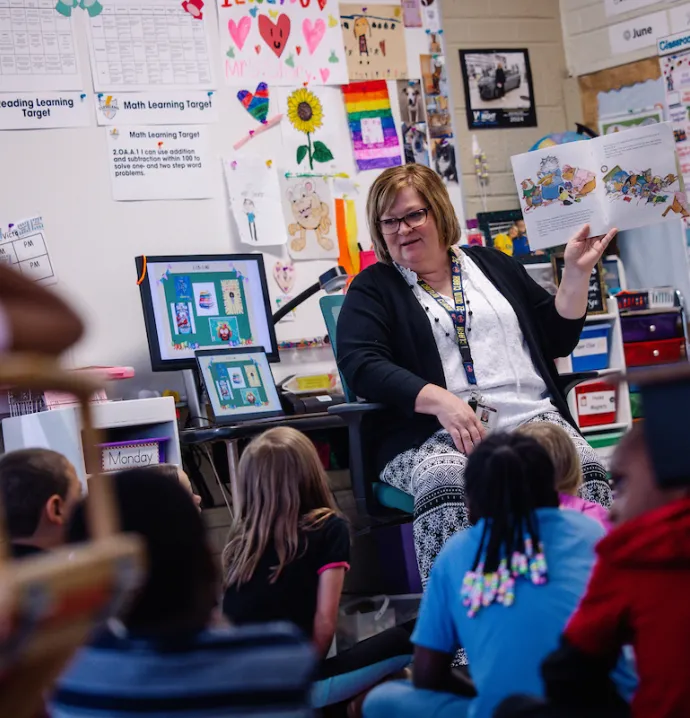Program Highlight: Women's & Gender Studies, MA
Program Highlight: Women's & Gender Studies, MA
UNI is home to dozens of innovative graduate programs, including the Women’s and Gender Studies MA. Founded in 1976 by Drs. Glenda Riley and Grace Ann Hovet, the program showcases the work of female and LGBTQ scholars, as well as educating students and the broader campus community on feminism, gender and sexuality, and related topics.
Staycie Lyman, Graduate Secretary for the Women’s and Gender Studies program, believes that UNI offers a unique experience to those who want to make local and global changes through activism and awareness.
What makes UNI’s Women’s and Gender Studies (WGS) program unique from other schools?
Our program brings students in from all over the country and world. If someone wants to study and learn alongside people with a diverse background, our program is for them! The WGS program’s goal is to create active practitioners in this important field of study, building upon the critical thinking, writing, and communication abilities that have been developed as an undergraduate student. WGS graduate students further cultivate these skills through analysis of theory and research that emphasize the importance of gender and sexuality, as well as other key issues in today’s global environment such as race, class, ethnicity, ability, and nationality. By working with prominent researchers in women’s and gender issues, both tracks of our MA program will further acquaint the student with the rapidly expanding literature in women’s history, feminist theory, and gender studies; train in historical research and interpretation; and encourage the student to combine academics and activism both within the university setting and the global community.
What special facilities or opportunities does UNI’s WGS program offer for graduate students?
Our program offers our students a graduate student office space next to our office. In it, we have a library of books that students are able to sign out. There is also a printer and 4 computers that are free to use 24/7.
What degree options are available to WGS graduate students at UNI?
The Thesis Track allows students interested in pursuing graduate and professional degrees to create a unique, interdisciplinary course of study that is specific to their interests and further develop their critical thinking and writing skills and social awareness. If being an educator is the goal, we have Teaching Assistantships available. In addition to going on to teaching positions, WGS MA graduates can also apply their experience to a vast array of doctoral programs, such as Africana Studies, American Studies, Anthropology, Communications, Comparative Literature, English, Feminist and Gender Studies, History, Political Science, Psychology, Social Science, as well as Women’s Studies, to name but a few. (Please note, a Comprehensive Exam is not a requirement in the Thesis Track. We now require an Activism Portfolio for both tracks.)
The Applied Track explores today's pertinent WGS issues with two focus areas: Gender and Wellness or Gender and Violence Prevention. Through creative, hands-on practice in an internship that prepares students for leadership roles, this track allows them to shape policy and create positive, lasting impact. Students who graduate with an MA in one of the Applied Tracks also have an edge in the current competitive job market and engage in a wide variety of career fields in the public and private sectors, including the arts, business and industry, education, health care, the media, politics, law, social work, and psychology.
What does the culminating project/experience in your program look like for grad students?
A student who is on the Thesis Track will have completed and defended their Thesis along with providing works of activism culminating in an Activism Portfolio. A student who is on the Applied Track will have completed an internship, written a Research Paper, and defended it, along with providing works of activism culminating in an Activism Portfolio.
What should prospective students know about your graduate faculty?
We are an interdisciplinary program that draws upon the expertise of affiliate faculty in most departments across campus. When working in an assistantship, there are many options, including research, teaching, and other opportunities that may come up.
How do graduate students fit into your department? How do they bring value to the program and enhance your community?
We are primarily a graduate program with an undergraduate minor. Graduate students are the soul of our program and bring an energy that often dictates what our program will offer to the university and community. Most of our non-academic programming is requested, coordinated, and put on by our graduate students.
What else would you like prospective students to know about the WGS program?
Our program is a diverse and supportive community where you will get to know your cohort, the director, and office staff. For many students, this community also becomes like a family, with related interests and passion for social justice issues.
Learn more about the WGS program here.




